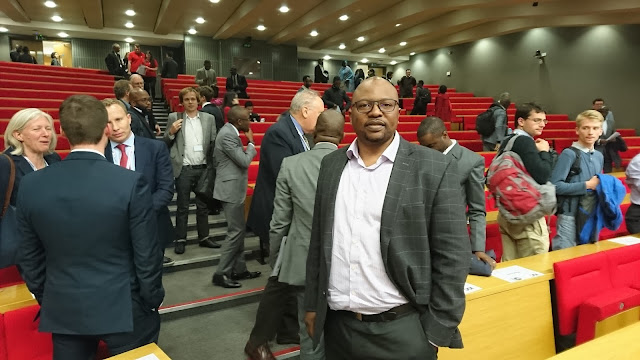“Kana
tsika nemagariro evanhu vakasiyana siyana dzikaunganidzwa panzvimbo imwe chete,
mumwe nemumwe anotora tsika nemagariro enyika yake, sezvo vanhu vese vachifunga
kuti dzavo tsika dzakanaka kukunda dzevamwe vese” – VaHerodotus, Nhoroondo Dzepasi
Chigare.
Uyo
mubvunzo wandabvunza pamusoro apo uyo wakauya mupfungwa dzangu mwedzi wapfuura,
sezvo ndakwanisa kufunga nezvawo kwemwedzi wese, mhinduro ndave nayo. Vazhinji
vanoteedzera zvandinonyora paFacebook pangu vanoziva kuti ndiri pakati
pekunyora bhuku rangu pamusoro petsika nemagariro evanhu vemuZimbabwe. Mubhuku
iri ndirikuda kunyatsocherechedza kuti ndione kuti tichiri kuchengetedza tsika
dzedu here, uye takasiyana papi mumagariro edu nevanhu vedzimwe nyika. Bhuku
rangu parinopera, richakwanisa kuudza avo vachateera kumashure kwedu kuti vanhu
veZimbabwe vanobvepi, vanoendepi, uyezve ndevapi vanokodzera kunzi vana veZimbabwe.
Pamusoro peizvozvi, richadzidzisa vanhu kuti ndedzipi tsika dzakakodzera
kuchengetedzwa uye ndedzipi dzakakodzera kuraswa sezvo dzinenge dzisisafambirane
nenguva.
Nekuti
handisi kuda kurembesa munamato sadza richiripora pano apa, ndichangoti ga ga
pakudaira mubvunzo wandabvunza pamusoro apo uyo. Bhuku rangu rinoshoropodza
mauyiro akaita vachena munyika yeZimbabwe, asi parinosiyana nevatongi vedzimwe nyika
vanoshoropodza kuuya kwevachena zuva nezuva asi ivo vachiteedzera tsika
dzevachena, pamwe chete ipapo vachinyara tsika dzedu dzechitema ndepekuti,
rinoti; hazvisi zvese zvakaunzwa nevachena zvakashata. Chakashata chete mauyiro
avo. Aya haasi mashoko angu aya, mashoko avaCesaire pavainyora Nhoroondo Yavo
Yemauyiro eVachena kuAfrica. VaCesaire vanoti ivo vanhu vega vega vanoda
kusangana nevamwe kuti vadzidzisane zvinhu zvakasiyana siyana zvinenge zviri
zvitsva kwavari. Ivo vachena vacho vakakwanisa kubudirira nekuti vaifamba
munyika dziripedyo navo vachiteedzera zvakanaka zvavainge vasina munyika dzavo.
Dai vakauya pahushamwari kuAfrica, ropa rakawanda ringadai risina kumbo deuka.
Kuti
ndinyatsopindura mubvunzo wangu regai ndikupei mufananidzo uyu: handizive kana
makaverenga here bhuku rinonzi Mapatya. Mapatya ibhuku rinoti pasi chigare
kwaiti kukazvarwa mapatya, vanhu vaiti zvinoshura munhu kuzvarwa vana vaviri,
saka mwana mumwe chete aitourayiwa kosara mumwe chete chete. Regai ndibva
ndangokuudzai kuti iyi ingori ngano, hazvireve kuti ndozvaiitika zvechokwadi,
asi chidzidzo chatinogona kuwana ipapo chakakosha zvakadaro. Ngatitii vamwe
vanhu vedunhu rakavakidzana neredu vobva vangokwanisawo kuziva kuti chii chaicho
chinokonzera kuti mapatya azvarwe, vosiya tsika iya yekuuraya mumwe chete wemapatya
– poshaya shura rinoitika kwavari - vakatishanyira vakatitsanangurira magariro
avavakuita kubva pavakaziva izvi, isu tinogona kuteedzera tsika yavo yavave
kuita zvisinga kanganise kana chinhu chimwe chete pamagariro edu. Zvishoma
izvozvo zvandataura izvi zvinofanirwa kutiudza kuti hazvina kuipa kuteedzeera
tsika nemagariro evamwe akanaka kana pasina zvakaipa zvinobva zvawira vanhu
vemunyika medu patinoteedzeera zvekunze izvi. Zvinhu zvatinenge tateedzera
kubva kunze zvinofanirwa kuti zvingoitwa kuti zvive zvinoenderana nezvimwe
zvakanaka zvinenge zviri mutsika nemagariro edu nekare.
Is It Necessarily
Bad To Copy Foreign Customs?
“For if
one should propose to all men a choice, bidding them select the best customs
from all the customs that there are, each race of men, after examining them
all, would select those of his own people; thus all think that their own
customs are by far the best”-
Herodotus, The Histories.
The above
question occurred to me about a month ago, as I have had a full month to think
it over, I also now have an answer for that question. As many who have seen my
Facebook posts are well aware, I am in the middle of writing my own book. My own
book interrogates what it means to be Zimbabwean, interrogates our national
identity and how we are distinctly different from people from other countries.
On completion, my book will inform posterity on our origins, our future and on
who has the right to claim to be Zimbabwean. Moreover, my book will locate Zimbabwe’s
place in the international system in such a manner that Zimbabweans will know where exactly
to draw their red lines against encroachment by the forces of globalisation (in
all spheres).
For
brevity’s sake I will just answer the question I asked above without taking the
circuitous route. Although, in essence, my book is a nationalist’s playbook, it
differs from politicians’ rhetoric in that it is sober in its assessment of the
impossibility of maintaining pure identities, customs and cultures. The
mixing of cultures was inevitable, what was wrong about it was how the white cultures
imposed themselves in Africa. These are not my own words but those of Cesaire
when he wrote his A Discourse on Colonialism. In that discourse, Cesaire maintains
that contact between civilisations is the oxygen that keeps civilisations
alive, he only says that Colonialism was not the best way of making contact.
He also points out that Europe's polities developed by learning from others who
were in close proximity. The Renaissance and Enlightenment being typical
examples. A different kind of contact between Europe and Africa would have spared so
much bloodshed.
To answer
my above posed question with imagery, let me give you this example; I don’t know if you
read the Shona book, Twins. In this book, the birth of twins was thought of a
something foreboding doom, and that doom could only be averted if one of the twins was
killed soon after birth. I do not need to tell you that Twins is a work of
fiction and that this did not necessarily happen in a particular epoch, still an important lesson can be drawn. Suppose a neighbouring people finds out, by trial and error, that no
doom will descend on the people because both twins were allowed to live, and
suppose these people visit us and tell us this, we can easily adopt their way
of doing things without any cost to our polity. This is my whole point, that we
can adopt other people’s customs as long as they do not ruin our people. What
we will adopt from foreigners will then just be streamlined and adapted to go along
with the great customs we already have.
 |
| I still have not settled on a book title. |








